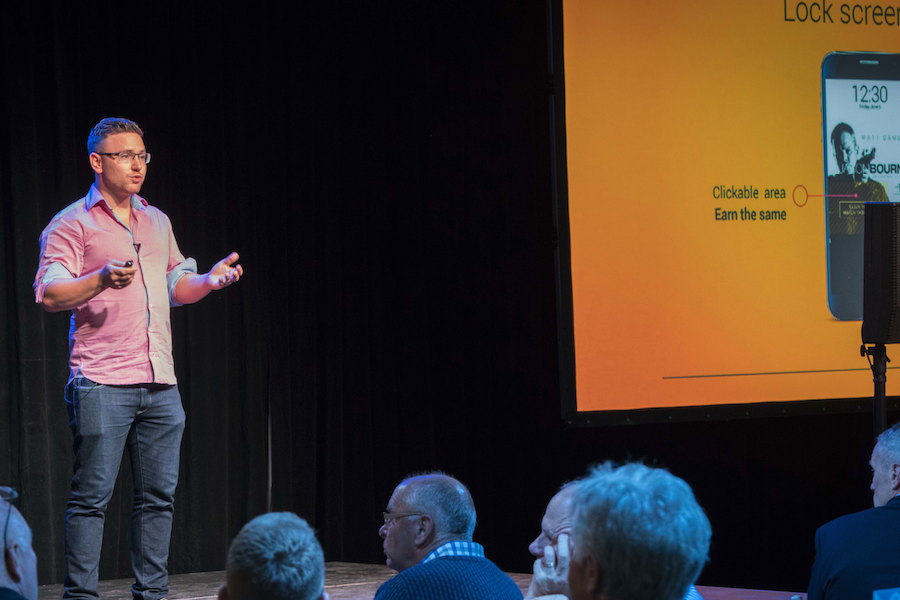If we’ve learned anything about the online world in the last few years, it’s that there isn’t a lot consumers want to sit through ads for. The exception to the rule is mobile data, or the gold of the 21st century for the smartphone-obsessed.
Taking advantage of this is Wellington-based startup Postr, which provides a platform for mobile network operators to show customers personalised deals and offers on their lock screens in exchange for a certain amount of free mobile data or extra credit.
The idea came to cofounder and CEO Milan Reinartz during his time working in advertising as a designer, where he was frequently frustrated with the limited availability and poor formats of mobile display media from a creative point of view.
“We’d come up with these campaigns we were proud of and had to squeeze the content into tiny banners and poor ad units. It just didn’t make any sense,” he said.
Founded in 2014, Postr originally launched with a business-to-consumer model, giving users cash for viewing ads through the Postr app. However, the team soon saw that people weren’t interested enough in getting a few dollars a month and began work on a business-to-business model, creating white label apps built in partnership with carriers.
“The idea of giving people mobile data in partnerships with carriers made a huge difference in retention levels and has put us on the map,” Reinartz said.
A customer of a partner carrier with an Android handset would simply download the app, sign up, and get a new lock screen showing them personalised offers. They can choose to either engage with the offer or unlock their phone as they usually would. In return, they can choose to receive extra data or credit.
For brands and agencies, Ben Searancke, Postr’s director of ad sales and partnerships across Australia and New Zealand, said this solution results in engagement rates up to 30 times higher than those seen for mobile banners, high conversion rates, and a deeper connection between mobile users and brands.
“[It’s] a chance for advertisers to engage at a ‘first touch’ opportunity before search or Facebook,” he said.
“Combining audience, placement and engaging creative at scale is the holy grail that many advertisers are looking for in mobile advertising.”
Postr has two partnerships already underway, with Skinny Mobile in New Zealand and with Optus in Australia, where Optus pre-paid customers can receive extra credit or up to 1GB in extra data in exchange for using the Optus Xtra app.
“The partnership with the telco is the most integral part of our business. We work with them from start to finish by understanding how this proposition works best with their existing roadmap and build the experience and commercial model around this,” Searancke explained.
Reinartz agreed, “I think we’re now already at a stage where most telcos are not just pipes anymore. They’re looking for new opportunities to maximise their assets and expertise all over. They provide you with content, partner with major pay TV players and so on.
“Sponsored data is a growing field of interest in the telco world and we fit well into that niche. There’s a number of benefits for carriers in doing this, ranging from revenue to brand loyalty and more. In terms of getting them on board, I would say this is about alignment and good relationships as it is in any other business.”
The experience is crucial; extra, free data may be as good as gold, but customers can go without if they have to go through too much to get it. Part of the experience also means receiving relevant offers; to do this, the telcos use anonymised customer data to create personalised advertising.
Reinartz said the process of creating the branded app for the telcos is collaborative; with the majority of the ‘skeleton’ already standardised, much of the process is about adding the surrounding elements such as visual design, branding, and minor integrations to make it a product the telcos customers recognise.
With the partnerships with Boost Mobile and Optus established, Postr earlier this month announced the closing of a $3 million funding round, with participation from investors including the New Zealand Venture Investment Fund, private backers from Singapore and New Zealand, and senior leadership from PayPal in the US.
The funding will go towards helping the startup expand further across Australia and Southeast Asia, with Postr stating it is in talks with a number of telcos in the region.
The startup has some cashed up local competition, with Australian startup Unlockd, which provides a similar service, raising a $15 million Series A round last April. Unlockd has a deal with Lebara in Australia, and has also launched in the US and UK.
Reinartz is not concerned, however, saying, “I believe we win big clients as a small company due to our core focus on user experience, customer value exchange, local market understanding, and agility.”
With that, the coming year will see Postr focus on deepening its relationships with existing partners and working with new ones to expand into new markets.
Image: Milan Reinartz. Source: Supplied.




















Trending
Daily startup news and insights, delivered to your inbox.